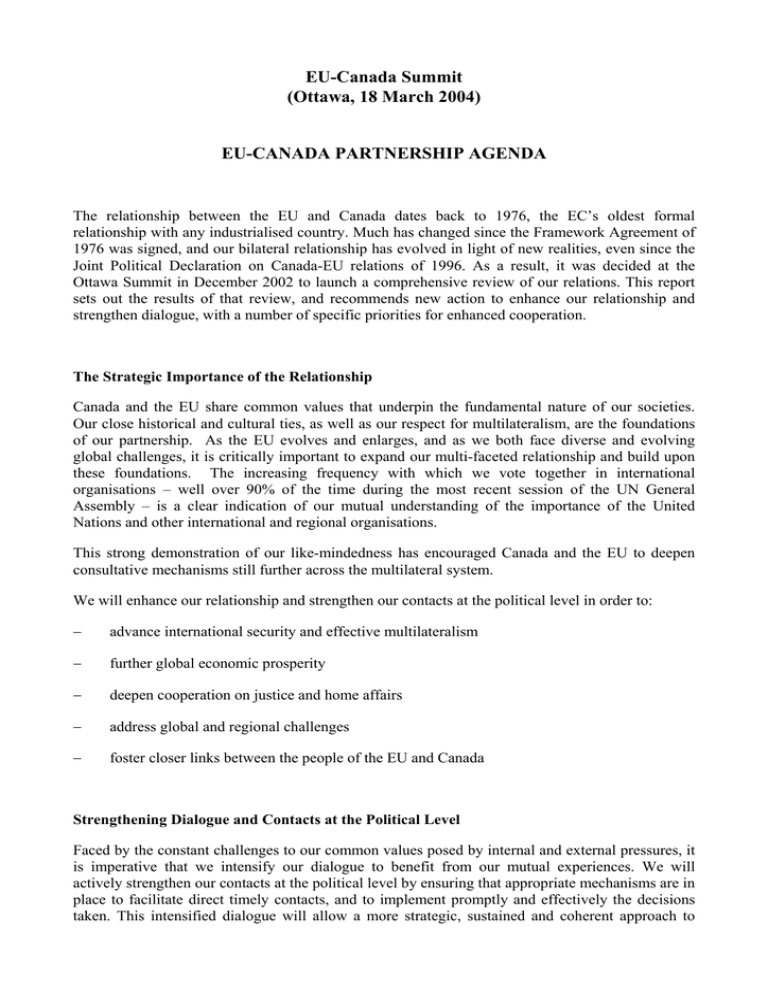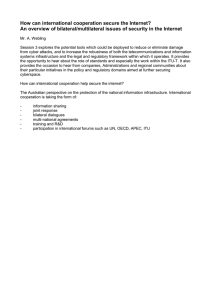Delegation of the European Union to Canada
advertisement

EU-Canada Summit (Ottawa, 18 March 2004) EU-CANADA PARTNERSHIP AGENDA The relationship between the EU and Canada dates back to 1976, the EC’s oldest formal relationship with any industrialised country. Much has changed since the Framework Agreement of 1976 was signed, and our bilateral relationship has evolved in light of new realities, even since the Joint Political Declaration on Canada-EU relations of 1996. As a result, it was decided at the Ottawa Summit in December 2002 to launch a comprehensive review of our relations. This report sets out the results of that review, and recommends new action to enhance our relationship and strengthen dialogue, with a number of specific priorities for enhanced cooperation. The Strategic Importance of the Relationship Canada and the EU share common values that underpin the fundamental nature of our societies. Our close historical and cultural ties, as well as our respect for multilateralism, are the foundations of our partnership. As the EU evolves and enlarges, and as we both face diverse and evolving global challenges, it is critically important to expand our multi-faceted relationship and build upon these foundations. The increasing frequency with which we vote together in international organisations – well over 90% of the time during the most recent session of the UN General Assembly – is a clear indication of our mutual understanding of the importance of the United Nations and other international and regional organisations. This strong demonstration of our like-mindedness has encouraged Canada and the EU to deepen consultative mechanisms still further across the multilateral system. We will enhance our relationship and strengthen our contacts at the political level in order to: − advance international security and effective multilateralism − further global economic prosperity − deepen cooperation on justice and home affairs − address global and regional challenges − foster closer links between the people of the EU and Canada Strengthening Dialogue and Contacts at the Political Level Faced by the constant challenges to our common values posed by internal and external pressures, it is imperative that we intensify our dialogue to benefit from our mutual experiences. We will actively strengthen our contacts at the political level by ensuring that appropriate mechanisms are in place to facilitate direct timely contacts, and to implement promptly and effectively the decisions taken. This intensified dialogue will allow a more strategic, sustained and coherent approach to issues affecting Canada and the EU involving an increasingly wide range of sectors. This rich dialogue will be conducted at many different levels, including inter-parliamentary contacts, and include areas beyond trade and foreign policy1. In order to manage the growing Canada-EU relationship effectively and to identify areas in which our dialogue should be strengthened, Canada and the EU will: − maintain the high level dialogue at Summit and Ministerial level on critical issues facing the international community; − make full use of opportunities for contacts between Canadian Ministers and their EU counterparts on policy issues of mutual relevance; − establish a Coordination Group to ensure the prompt and effective implementation of decisions taken at the political level, to review all elements of the relationship and ongoing discussions between Canada and the EU, to identify new areas for cooperation, and to prepare meetings at Summit and ministerial level; − bring the legal framework governing EU-Canada relations up to date, once the enlarged EU has concluded its process of constitutional reform. A. Advancing International Security and Effective Multilateralism Canada and the EU are committed to advancing international peace and security through a more effective multilateral system and through the promotion of the international rule of law. The EUNATO relationship is an important expression of the transatlantic partnership. We share common values of democracy, respect for human rights and the rule of law. We will: − strengthen our common approaches to international issues. This includes consultations between leaders, foreign ministers, political directors, and Troika meetings at the diplomatic level. − work together to tackle the preeminent threats to global security: terrorism, proliferation of weapons of mass destruction, failed states and poverty. The recent EU Security Strategy marks an important contribution to this and Canada will cooperate with the EU as it implements its strategy. Canada and the EU will cooperate on efforts to prevent the proliferation of weapons of mass destruction, particularly through strengthening the implementation of and compliance with disarmament and non-proliferation treaties and agreements, and the further development of verification instruments. We are both supporting the G-8 Partnership Against the Spread of Weapons of Mass Destruction, as agreed to at the Kananaskis Summit in 2002. − work together to strengthen transatlantic security, taking into account the central role of the existing transatlantic security architecture between Europe and North America. 1 Such as: environment, justice and security, migration and integration, fisheries, education, culture, northern development and indigenous issues, youth exchanges and transport security. − enhance cooperation in EU crisis management missions and peace-keeping operations and give consideration to the negotiation of ways to define Canadian participation in such missions, through agreed effective implementation of the Conclusions of the Seville European Council. Canada and the EU attach great importance to the functioning of the multilateral system, particularly the role of the United Nations in maintaining world peace and the international rule of law. To ensure the effectiveness of the multilateral system we will: − work together to help reinvigorate the UN and to develop initiatives to make multilateralism more effective, through examining joint approaches on issues such as sustainable development, human rights, humanitarian assistance and peacekeeping.. − continue, as we have done in the past, to seek agreement on new rules governing international action on the protection of a population from the effects of civil conflict and state failure taking into account the report of the International Commission on Intervention and State Sovereignty: The Responsibility to Protect. − work together to ensure the full establishment of the jurisdiction of the International Criminal Court. − enhance efforts to coordinate positions in advance of international meetings, including in the field of human rights and other humanitarian fields. − seek greater collaboration among nations to ensure that economic policies are coherent and linked with enhanced policies and programmes in support of developing countries’ efforts to: (1) alleviate hunger, poverty and disease (2) enhance their social infrastructure, and (3) help raise standards of living. − enhance our capacity to coordinate the delivery of démarches in other third countries, through systematic and regular contact at the diplomatic level. − share experience and expertise in engaging NGOs through formal consultations, and in the field. − continue to reinforce our co-operation in multilateral fora in the field of development assistance including in the context of international efforts to harmonise donor practices and cooperate more actively at the bilateral level. We will enhance the frequency and level of contact between the Canadian International Development Agency and EU agencies responsible for development assistance, in order to capitalise on common approaches. − work together in the context of the Africa Partnership Forum to broaden international political and practical support for the New Partnership for Africa’s Development (NEPAD), a pledge by African leaders reflecting their common vision for Africa. − enable access to medicines for those who need it to address public health problems in developing countries, particularly, though not exclusively, in Africa. Canada and the EU are committed to contribute to this goal by encouraging companies to provide medicines to the developing world at affordable prices and by enacting legislation to implement the August 30th 2003 WTO Decision on the TRIPs Agreement and Public Health. − explore the possibility of closer coordination in other international or regional organisations in which they participate, including where appropriate UN specialised agencies and subsidiary organs and regional organisations such as the OSCE and OECD. − seek to cooperate more closely within international financial institutions such as the European Bank for Reconstruction and Development. B. Advancing Global Economic Prosperity Canada and the EU are key trading and investment partners. We are committed to the promotion of global economic growth and prosperity, and we share the belief that the liberalisation of trade and investment plays a major role in this respect. Canada and the EU confirm their full support for the WTO as the best framework for a strong, inclusive, rules-based, global trading system. We commit ourselves to working towards an ambitious outcome to the Doha Development Agenda and to making decisive progress during 2004. In addition, we will consolidate and further enhance our bilateral economic partnership. We are living in an increasingly interdependent economic space, and, as a result, foreign direct investment and regulatory issues have increased in relative importance. To address this new reality, we will take the necessary steps on both sides to open formal negotiations for a forward-looking bilateral Trade and Investment Enhancement Agreement with the intention of facilitating and strengthening bilateral trade and investment flows, focussing on the new challenges facing our bilateral economic relations, notably regulatory barriers to trade and investment. Canada and the EU have also agreed to develop a voluntary framework for regulatory co-operation to enhance the use of best practices, improve the effectiveness of regulatory initiatives and facilitate trade and investment. Science and technology and innovation are critically important to our economic prosperity. We will intensify our cooperation by organising thematic workshops to examine areas of collaboration and increasing partnerships under the EU's Sixth Framework Programme, by raising awareness of collaborative opportunities and by developing approaches to aid in the creation of partnerships. There were at least 75 collaborative S&T projects under the EU’s Fifth Framework Programme (1998-2002), with the active involvement of about 80 Canadian researchers, as well as several hundred EU researchers. In addition to cooperation between Canada and the EU there are a multitude of existing bilateral agreements between Canada and EU Member States on science and technology, involving governmental institutions, university research centres, private foundations or the private sector. The EU and Canada will continue to intensify their cooperation in the area of electronic communications and information technology. In the field of transportation, the EU and Canada will: − enhance cooperation in transportation so that the transatlantic flow of goods, peoples and services is not disrupted by new security measures. − work together to promote international measures to facilitate the travel of legitimate passengers, while maintaining a high level of air transport security. − conclude negotiations on sharing Advanced Passenger Information and Passenger Name Records. − negotiate an agreement to enhance maritime security through an advanced container initiative and develop a multilateral agreement for the shipment of maritime cargo. − pursue high-level dialogue on customs issues. − explore options for negotiating further enhancements in air services. C. Advancing Cooperation on Issues of Justice and Home Affairs Canada and the EU share common objectives in the field of justice and home affairs, both in terms of the ongoing fight against terrorism and organised crime and in the context of safeguarding civil liberties. The movement of people, migration and asylum are also key issues in terms of global governance. To this end, we will: − strengthen judicial cooperation through Canada’s continued active engagement with Eurojust. − conclude an operational agreement between Canada and Europol. − consider agreements on extradition and mutual legal assistance to supplement the agreements Canada already has with EU Member States. − Enhance cooperation to increase legitimate movement of people between Canada and the EU. − continue to cooperate on migration and asylum issues. We will develop a high level exchange of information on policy and programs pertaining to immigration, security and protection. − exchange information on best practices concerning the integration of immigrants, building on the success of the recent EU-Canada Immigrant Integration Forum "Making Immigrants Part of Society: the Canadian Experience" building on numerous initiatives between Canada and EU Member States. − improve the exchange of strategic, tactical, technical and operational information, and cooperate in policy development, with a view to combating illegal and irregular migration. − pursue coordinated action through international institutions to enhance the protection of refugees through the development of durable solutions, including third-country resettlement, where appropriate, while maintaining the integrity of our asylum systems. − explore opportunities to co-ordinate still further our policies and procedures on return, for example in the development of strategies for dealing with unco-operative receiving countries, transiting removals, and the establishment of best practices and common principles. D. Cooperating on Global and Regional Challenges Canada and the EU share a number of common policy approaches and commit themselves to cooperating to address both global and regional challenges. In particular, we are committed to looking at ways of cooperating to ensure the better management of the global commons. We both recognise the importance of dialogue and cooperation on a wide range of environmental issues. We will work towards the timely entry into force of the Kyoto Protocol, thus reaffirming our strong commitment to the UN Framework Convention on Climate Change and the Kyoto Protocol. We will examine ways to extend our cooperation in researching alternative energy technologies and energy efficiency. We will further our exploratory discussions on the negotiation of an agreement linking our respective emissions trading regimes within the framework of the Kyoto Protocol. We will initiate consultations on the means to reinforce our efforts to combat climate change beyond 2012. Canada and the EU will work towards common conservation objectives in regional fisheries management organisations like the North West Atlantic Fisheries Organisation. Canada and the EU will maintain an open and transparent dialogue on fisheries issues with all parties concerned including the fisheries industry. Our dialogue will take into account international instruments such as the United Nations Convention on the Law of the Sea and the United Nations Agreement on Straddling and Highly Migratory Stocks. Canada and the EU will work together through the Forest Law Enforcement and Governance (FLEG) and other multilateral processes to combat illegal logging and trade in illegally harvested wood in the world’s priority problem areas. Canada and the EU have shared interests and concerns in the North, as stated in our 1999 Joint Statement on Northern Cooperation. This EU-Canada Statement has been the framework that guides our cooperation in the North. The EU’s and Canada’s Northern dimension policies recognise each other as key partners in the North. In the context of the Northern Dimension, Canada and the EU will: − identify and pursue coordinated actions in the field of the environment including climate change, sustainable development and trans-boundary pollutants, especially through the EU Northern Dimension Environmental Partnership. − work in partnership on the development and implementation of the EU Northern Dimension Partnership for Heath and Social Well-being, launched in Oslo on 27 October with Canada among its founding partners. − identify ways to strengthen links in education through the University of the Arctic and, where appropriate, the Canada-EU Higher Education Agreement. − enhance cooperation in areas of emerging interest including transportation and communication, legal instruments, and economic development and capacity building in Russia. Canada and the EU attach particular importance to cultural diversity. We have a shared interest in promoting cultural pluralism, as well as a shared need to ensure the promotion of recognition of cultural diversity multilaterally. We agree to examine ways to deepen our cooperation on cultural matters in international fora, including on the development of a UNESCO Convention on cultural diversity. E. Fostering People to People Links Our long-standing cultural, linguistic and traditional links have long built bridges between our peoples. Linkages across the Atlantic exist at all levels of government and society from the supranational to nation-state, provincial/sub-national and municipal levels. The impact of the Canada-EU relationship is significant across Canadian and European societies. We need to support these contacts and to seek new ways to foster links between our respective peoples by: − promoting the effective participation of all citizens, especially local communities and Indigenous Peoples, in decision and policy-making. − broadening the scope of Canadian and EU exchange programmes for young people. This new co-operation will supplement the wide range of existing programmes that EU Member States and Canada have developed over the years, building on established programs between Canada and EU Member States involving educational institutions, private and public institutions, and foundations. As a first step, Canada and the EU will organise a seminar for youth structures in 2004. Canada and the EU will welcome and encourage agreements between Canada and individual EU Member States. − exploring avenues to reinforce and broaden the scope of our cooperation when we renew our co-operation Agreement on Higher Education and Training. We will also explore ways to upgrade the existing Agreement by improving access for all higher education and training institutions, and by increasing student/trainee exchanges. We will also explore options for including a “work experience” component involving language training and/or internships. We will encourage students and scholars to take advantage of the new opportunities offered by the EU’s Erasmus Mundus programme. − encouraging greater opportunities for discussions between parliamentarians, building on our annual inter-parliamentary meetings. The most recent visit of the European Parliament’s Canada Delegation in October 2003 resulted in a number of specific suggestions for areas of cooperation including the environment and justice and home affairs. We will encourage increased contacts between Committees of the Canadian and European Parliaments as well as targeted visits on specific issues of mutual interest by Members of the European Parliament and the Canadian Parliament. − devoting efforts to support the establishment of business-to business contacts. We will reaffirm our support for the useful role of the Canada-Europe Round Table (CERT) as a valuable forum for our business community on both sides of the Atlantic. CERT has provided strong support in our work to develop a Trade and Investment Enhancement Agreement. CERT also provides a regular interface for government-to-business dialogue. ________________________



